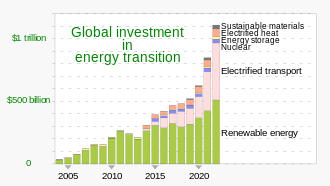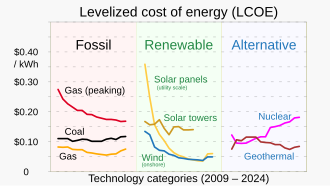
Back التخلص التدريجي من الوقود الأحفوري Arabic জীবাশ্ম জ্বালানির ব্যবহার ধাপভিত্তিক বন্ধকরণ Bengali/Bangla Ukončování využívání fosilních paliv Czech Abandono de los combustibles fósiles Spanish حذف تدریجی سوختهای فسیلی Persian Sortie des combustibles fossiles French Penghapusan bertahap bahan bakar fosil ID Uitfasering van fossiele brandstoffen Dutch Wycofywanie się z użycia paliw kopalnych Polish په تدریجي بڼه له فوسیلي سون توکو څخه نه ګټنه Pashto/Pushto


Fossil fuel phase-out is the gradual reduction of the use and production of fossil fuels to zero, to reduce air pollution, limit climate change, and strengthen energy independence. It is part of the ongoing renewable energy transition, but is being hindered by fossil fuel subsidies.
Many countries are shutting down coal-fired power stations,[6][7][8] and fossil-fuelled electricity generation is thought to have peaked.[9] But electricity generation is not moving off coal fast enough to meet climate goals.[10] Many countries have set dates to stop selling petrol and diesel cars and trucks, but a timetable to stop burning fossil gas has not yet been agreed.[11]
Current efforts in fossil fuel phase-out involve replacing fossil fuels with sustainable energy sources in sectors such as transport and heating. Alternatives to fossil fuels include electrification, green hydrogen and biofuel. Phase-out policies include both demand-side and supply-side measures.[12] Whereas demand-side approaches seek to reduce fossil-fuel consumption, supply-side initiatives seek to constrain production to accelerate the pace of energy transition and reduction in emissions. It has been suggested that laws should be passed to make fossil fuel companies bury the same amount of carbon as they emit.[13] The International Energy Agency estimates that in order to achieve carbon neutrality by the middle of the century, global investments in renewable energy must triple by 2030, reaching over $4 trillion annually.[14][15]
- ^ "Energy Transition Investment Hit $500 Billion in 2020 – For First Time". Bloomberg New Energy Finance. 19 January 2021. Archived from the original on 19 January 2021.
- ^ Catsaros, Oktavia (26 January 2023). "Global Low-Carbon Energy Technology Investment Surges Past $1 Trillion for the First Time - Figure 1". Bloomberg NEF (New Energy Finance). Archived from the original on 22 May 2023.
Defying supply chain disruptions and macroeconomic headwinds, 2022 energy transition investment jumped 31% to draw level with fossil fuels
- ^ "Global Clean Energy Investment Jumps 17%, Hits $1.8 Trillion in 2023, According to BloombergNEF Report". BNEF.com. Bloomberg NEF. 30 January 2024. Archived from the original on 28 June 2024.
Start years differ by sector but all sectors are present from 2020 onwards.
- ^ Chrobak, Ula; Chodosh, Sara (28 January 2021). "Solar power got cheap. So why aren't we using it more?". Popular Science. Archived from the original on 29 January 2021. ● Chodosh's graphic is derived from data in "Lazard's Levelized Cost of Energy Version 14.0" (PDF). Lazard.com. Lazard. 19 October 2020. Archived (PDF) from the original on 28 January 2021.
- ^ "Lazard LCOE Levelized Cost Of Energy+" (PDF). Lazard. June 2024. p. 16. Archived (PDF) from the original on 28 August 2024.
- ^ "Nearly a quarter of the operating U.S. coal-fired fleet scheduled to retire by 2029". www.eia.gov. Retrieved 21 February 2023.
- ^ "Australia hastens coal plant closures to catch up on climate". Nikkei Asia. Retrieved 21 February 2023.
- ^ "Our members". PPCA. 2 August 2022. Retrieved 21 February 2023.
- ^ Cuff, Madeleine. "Renewables supply 30 per cent of global electricity for the first time". New Scientist. Retrieved 26 May 2024.
- ^ "Coal-Fired Electricity – Analysis". IEA. Retrieved 21 February 2023.
- ^ "No EU agreement on fossil phase-out text". Argus Media. 20 February 2023. Archived from the original on 20 February 2023. Retrieved 21 February 2023.
- ^ Green, F.; Denniss, R. (2018). "Cutting with both arms of the scissors: the economic and political case for restrictive supply-side climate policies". Climatic Change. 150 (1): 73–87. Bibcode:2018ClCh..150...73G. doi:10.1007/s10584-018-2162-x. S2CID 59374909.
- ^ "Fossil fuel producers must be forced to 'take back' carbon, say scientists". The Guardian. 12 January 2023. Retrieved 12 January 2023.
- ^ Bank, European Investment (2 February 2023). Energy Overview 2023 (Report).
- ^ Nations, United. "Renewable energy – powering a safer future". United Nations. Retrieved 9 March 2023.